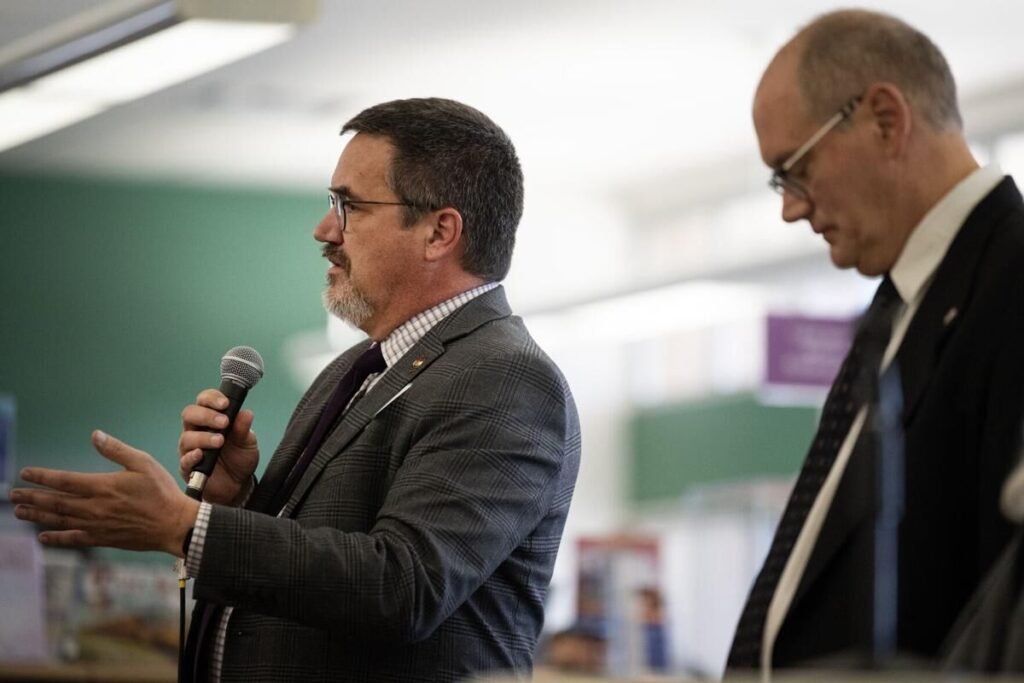Kato Crews confirmed by Senate to Colorado’s federal trial court

The U.S. Senate confirmed S. Kato Crews to a judgeship on Colorado’s U.S. District Court on Wednesday by a vote of 51-48, restoring the trial court to its full roster of seven active judges.
With Crews’ confirmation, President Joe Biden has now appointed five of the court’s members, marking an unusually high level of turnover during his administration. For the first time since 2015, there will be no vacancies or impending vacancies among the district judges, barring an unforeseen event.
Crews, who serves as a magistrate judge, will also trigger a vacancy for his current position. As with their Senate-confirmed counterparts, the magistrate judge bench has also experienced an influx of new members, with five of the nine seats changing hands since 2021, including Crews’.
To fill the district court vacancies, U.S. Sens. Michael Bennet and John Hickenlooper rapidly screened candidates and forwarded finalists to the White House, with the assistance of an advisory committee. The process has resulted in the appointments of Regina M. Rodriguez, the first Asian-American district judge in Colorado; Charlotte N. Sweeney, the first openly gay judge; Nina Y. Wang, the first magistrate judge to receive a lifetime appointment; and Gordon P. Gallagher, the first district judge to be stationed on the Western Slope.
“Judge Crews will become the only district court judge born and raised in Pueblo,” said Bennet on the Senate floor shortly before Crews’ confirmation vote. “That means something to me and to (Hickenlooper), bringing a really important perspective to the bench from a critical, but sometimes overlooked, part of our state.”
Crews succeeds Raymond P. Moore, a Barack Obama appointee who took a form of semi-retirement known as senior status last summer. The White House announced in February 2023 that Crews was Biden’s choice for the seat.
Republican U.S. Sens. Susan Collins of Maine and Lisa Murkowski of Alaska joined Democrats in voting for the confirmation.

michael.karlik@coloradopolitics.com
Crews graduated from the University of Northern Colorado in 1997 and received a law degree from the University of Arizona in 2000. He then spent one year working for the National Labor Relations Board investigating and prosecuting allegations of unfair labor practices by employers.
Beginning in 2001 and for the next 17 years, Crews was in private practice, largely defending employers against civil lawsuits. He also began to represent individual workers and a union.
In 2018, the district judges on Colorado’s federal trial court appointed Crews as a magistrate judge, a position that focuses on preliminary and administrative matters in cases. Magistrate judges can, however, handle nearly all the tasks of the life-tenured district judges. Crews has presided over six civil trials in that time.
During his Senate Judiciary Committee hearing last year, Crews came under criticism from Republican members for having his judicial orders or recommendations reversed 18 times – out of his more than 1,700 total decisions.
In a noteworthy exchange, Crews could not immediately recall the U.S. Supreme Court’s landmark decision of Brady v. Maryland, which obligates prosecutors to disclose evidence favorable to the defense. U.S. Sen. John Kennedy, R-La., asked him how he would analyze a “Brady motion.”
“In my 4.5 years on the bench, I don’t believe I had the occasion to address a Brady motion,” Crews responded.
“Do you know what a Brady motion is?” Kennedy continued. Crews responded it was “not coming to mind at the moment.”
Lawyers familiar with Colorado’s U.S. District Court were sympathetic toward Crews following the flub, noting magistrate judges do not handle “Brady motions” in felony criminal cases and that all nominees will need to learn about certain aspects of the law upon taking the bench.
In written responses to senators’ questions following his hearing, Crews elaborated upon his failure to recall the Brady decision.
“In my 22-plus years in the legal profession, including my four-plus years as a United States Magistrate Judge, I have not dealt with Brady motions,” he wrote. “I do not recall any party filing a Brady motion in a misdemeanor criminal matter I have presided over as a magistrate judge, nor do I recall any district judge referring a Brady motion to me in a felony criminal matter.”
Crews added that, in general, when he encounters a legal issue unfamiliar to him, “I might also consult other judicial colleagues with experience facing those issues – the collegiality among the judges in the District of Colorado has included these types of consultations.”

Biden, before taking office, asked senators to forward candidates for judgeships whose demographics or professional backgrounds were historically underrepresented on the bench. In Colorado, that has meant the inclusion of sitting magistrate judges in Bennet and Hickenlooper’s recommendations. Until 2022, no magistrate judge had ever been confirmed as a district judge in Colorado, even though the practice is common in other federal judicial districts.
It was “a real missed opportunity because the magistrate judges could hit the ground running, as they understood the job and the court,” Frances Koncilja, who served on the senators’ advisory committee, told Colorado Politics last year.
Carl Tobias, a University of Richmond law professor who follows federal judicial nominations, observed Colorado’s senators worked well with the Biden administration to reconstitute the court’s membership.
“Magistrate Judge Crews was a very experienced, mainstream nominee who will join a number of other well qualified, centrist Biden nominees who have filled the District of Colorado vacancies,” he said.














